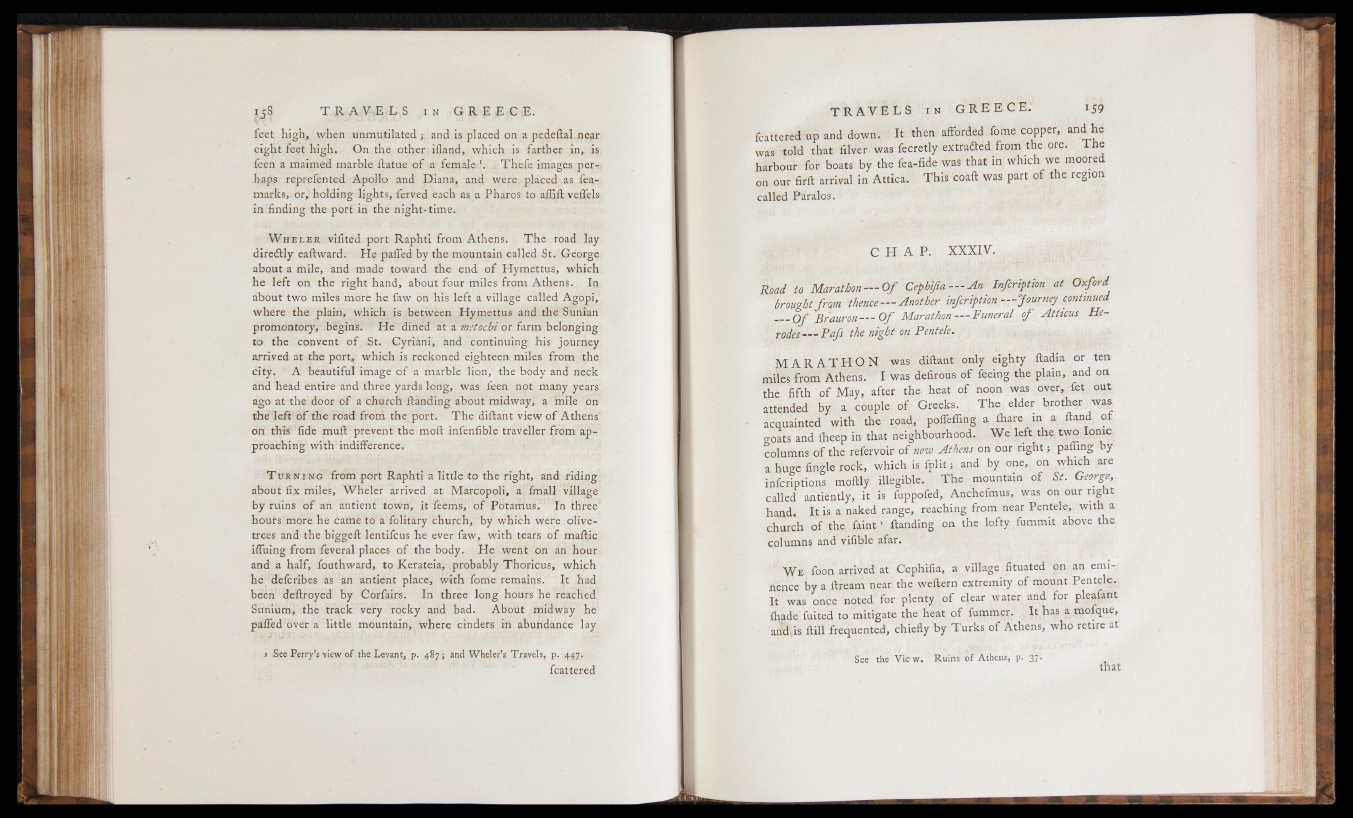
feet high, when JnSt^typlaiced pn. a.pe^e^Li^ear
eigh t Feet facther in», .is,
feen a maimed marble, ftataelpf •ai.fepiale \ J Thsfe imagfismerTj
taps reprefented Apollo, and piana, and were. placed as. fta-
mades, or,‘ boldingdl^ts, dèrvsed ea9b as a Pharos to afft&vpj(M&
m ’finding thevport ia thé-ni^ht-time.
’Whelb®: «iMëd ,j*©rt Raphti from Athens. The road lay
diredtly eaftward. He paffed by the mountain called
about a mile, and > made toward the end of Hymettus., which
he left on the right hand, about four,miles from Athens.. In
abbüi‘fwó> miles"mbië hie "law on his left a village‘called Agopi,’
where the. plain, |which is between Hymettus and .the ‘Suntan
promontory, bèginE* He idiSM^ai a ^ l ^ S I or farm belonging;
to thei conyent of St. Gyrilni»* ^nd continuing his journey
arrived at the port, which is reckoned eighteen miles from.rthe
City. “°A oeaUtiful iihageöf U ’mafbfe^ 'liom- the body and neck
aSffl frë&d èiitire^kèdi three yards long, was'.feen not'many years
ago at the door o f a church Handing about midway^ a mile 'on
th e ie ffo f the road from the port. TBe diftant view pfAthens'1
dii this fide ffiuH-pavent the nioft iaféufihïè traveller frbbys&i;“
proaching1 with‘ indifference; ;
TuENi N;(?°from pórt Raphti a little to the right, and ridipg
about fix miles, WHelêr arriveil at Marcopoli, a fm^ll village*
by ^uink o f ah fntidnt 'towUi1 it Hems^ of Ptltamok.31 !ïn tfirëe?
houfs^molte.1 he camë‘tóFa)mfötkty^fchurchi by WmcS s^ere olivC-
trees and the biggelt lentifeus he evdi'faw, with, tears of maftic
ifluing from feveral places of the;body. He went on an hour
and a half,, douthward, to Kerateia, probably Thoricius, which
hëadèfcribes aif5aii antierit place; withobrfie remilns. It had
bëéh' dettroVetf’ By Corfairs. In three long hours he reached
Sunium, thë'ïrkck veiy róbky aiïd had* About midwiy hë‘
paffed over a little mountain, where cinders in abundance lay
t j See Perry’s view of the Levant, p. 487; and Wheler’s Travels, ÈÉÉéÊÊk'1
fcattered
*59
^ttered-Kpind ddwhi-: It then: afforded: fome’.copper, andhe
was told that filler was' fecretlytextra<fted from the ore. I he
harbour for boats by the fea^iidowas that in’which we moored
oh our firft arrival in Attica., th is Coaft was part o f the region
called Pkralos.
C H. A , P. XXXIV.
Road to Marathon---Of Cephifa"— An^ Infcription at Oxford
W fW p i p i 'thence-'" Another infcription'---Journey continued
,0/ B r a u p n - - - ° M i Atticns... He-
rodes- - - Pcfs the flight' ^n Pentejc* p j
M A R A T H O N was diftant only eighty ftadia or ten
miles frdm A'tfenf^ I was clefirous o f feeing the plain, and on
the fifth of May, after the- heat of noon was oyer,, fet out
attended b y . a couple Greeks. The elder brother was
acquainted with, the t o ^ f ppfeffmg a ?^ r e .J p %
gbits and fheep in that neighbourhood. We left the. two,Ipnxc.
column's of thei rdfervoir of new Athens bri'our'right * paffing by
a huge fingle rock, Which is fpliM and by j i | g i on wfiiqli fire
imcriptions moftly illegible. The mountain of • St. George,
called aptiently, it fs fuppofed, Anchefmus, was on our right
haad, It i§ a naked range, reaching from near Pentele,. with a
church o f the faint/ Handing, on the Ipfty/ummit above,the;
cplumns and vifiBle afar. >
m m m d Cephifta, a village fituatejJ on an emi-:
hbnee t y a ftftam hear' the weftern extremity of i^gijpt P e n ^ , j
]|^wa^pn|e npted^for plenty,^pf clear \ya|eri:^i^ |g|
{hade fpit,eW to mitigate tfie ftgat pf/^rodiSf. -ft
arf^is ftill frequeiited, cBiefly'by Turks of Athens, who retire at
See the View. * Ruins of Athens, p. 37. m k
that